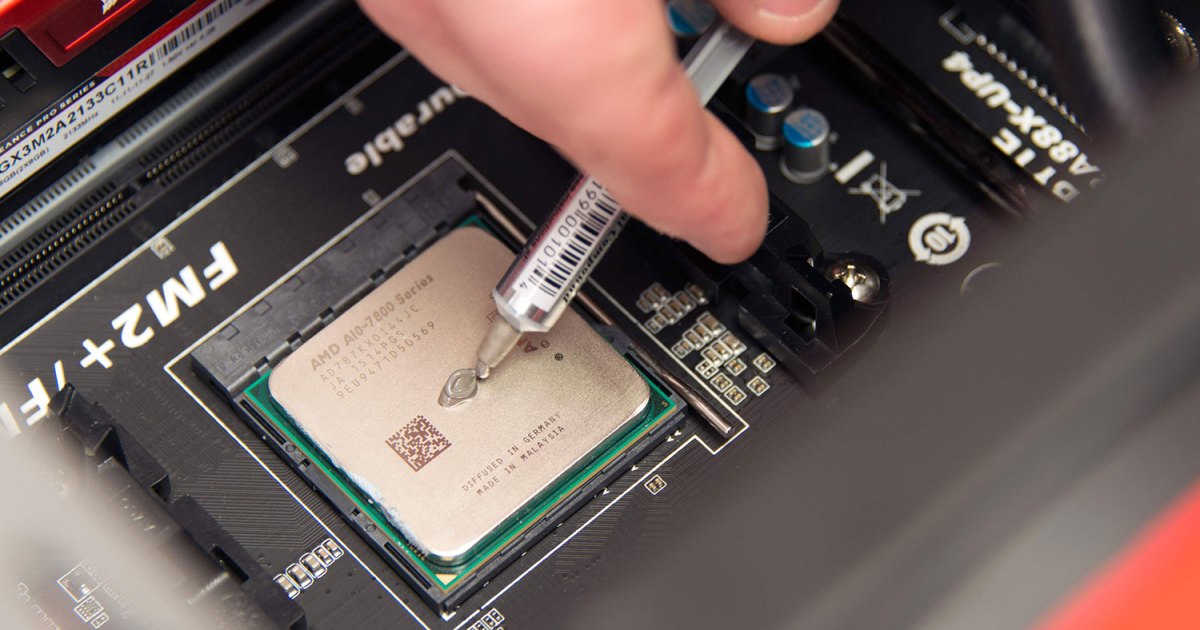Whether you are building your own gaming rig or making some serious upgrades to a professional workstation, a good thermal paste can do wonders for your system temperatures. As in the case with CPU coolers, investing in an aftermarket paste is necessary especially if you have a CPU that runs hot or if you are planning to do some overclocking. There are several thermal compounds available on the market from brands like Arctic, Noctua, and Thermal Grizzly, but choosing the right one can be confusing. To make things easier, here are some of the best thermal pastes we’ve tried, along with important FAQs that can help you make a sound decision.
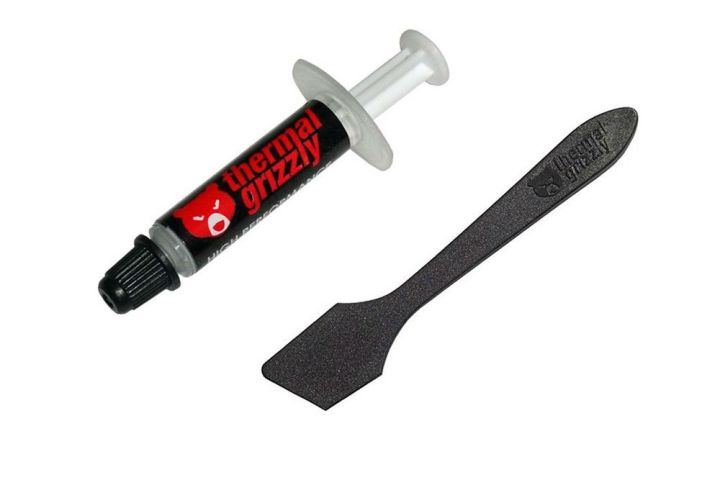
Image used with permission by copyright holder
Thermal Grizzly Kryonaut
Great performance and conductivity
Pros
- High thermal conductivity
- Suitable for both air or liquid coolers
- Best-in-class performance
Why should you buy this: It is one of the best-performing pastes with excellent thermal conductivity.
Who’s it for: Gamers and serious CPU/GPU overclockers.
Why we picked the Thermal Grizzly Kryonaut:
Thermal Grizzly has a few excellent thermal pastes on the market, but our favorite is Kryonaut, a high-end paste designed for the most serious applications and experienced users. It’s extremely conductive at 12.5 W/mk (higher than almost all pastes on the market) and can move heat easily and quickly across even large or complex cooling devices, including water-cooling systems.
While this paste may be overkill for some, it’s one of the best pastes around in terms of its cooling potential and is a favorite among gamers and overclockers. That is reflected in the cost, which is high for just a single gram of the paste. But if you want the most out of your machine and are already heavily invested in overclocking or tweaking performance, the Kryonaut is certainly worth the price.
Do note, however, that since it is targeted at overclockers, this is a paste that is designed for high-performance more than longevity, so it has a tendency to dry out after a few months. Factor in frequent re-pastes if you plan to use this for your daily driver PC.

Thermal Grizzly Kryonaut
Great performance and conductivity
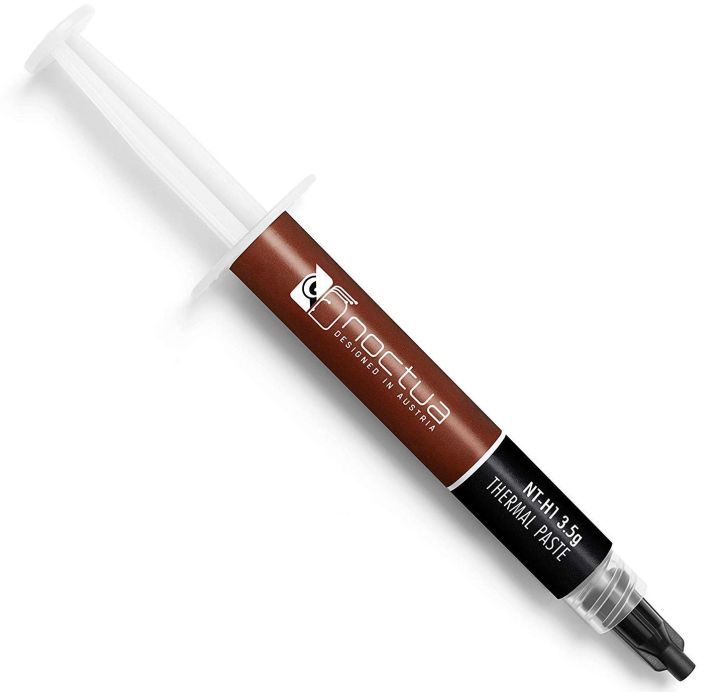
Image used with permission by copyright holder
Noctua NT-H1
Best performance on a budget
Pros
- Easy to apply
- Reliable thermal performance
- Good lifespan
Why should you buy this: A reliable and cost-effective thermal paste.
Who’s it for: PC builders who need a price-effective solution.
Why we picked the Noctua NT-H1:
Noctua’s NT-H1 is a super-reliable paste that has been around for years. It is regarded as one of the best with more than 150 awards and recommendations, and it’s one of the best options for building or repairing computers, especially for amateurs who may not yet have a lot of experience with thermal pastes but are confident enough to use them. The NT-H1 formula also gets excellent marks for usability, with an easy-to-apply consistency. It’s easy to clean when dry and is designed to not corrode.
Note that Noctua’s NT-H1 lasts for about three years without use, which is quite good for a thermal paste. As for usage time on the CPU, Noctua claims that it can last up to five years before it needs a refresh. Available for purchase in either 3.5-gram or 10-gram options, the NT-H1 is relatively cheaper, making it one of the best all-rounders on this list.

Noctua NT-H1
Best performance on a budget

Arctic / Arctic
Arctic MX-6
Carrying forward the legacy of MX-4
Pros
- Multi-year durability
- Competitive pricing
- Greater thermal performance than MX-4 and 5
Why should you buy this: It is a great alternative for the Thermal Grizzly Kryonaut at a better price.
Who’s it for: Anyone looking for high-performance and longevity at a good price.
Why we picked the Arctic MX-6:
Designed as a direct replacement for MX-5, the new MX-6 improves performance with a thicker viscosity than either the MX-4 or MX-5, making it a little trickier to install, but enhances its longevity. It requires no burn-in period and will offer peak performance right from the get go. Its price remains competitive, too, thanks to the use of no precious materials like silver or diamond in its construction.
Like most heat pastes, Arctic MX-6 is non-electrically conductive, so you needn’t worry about it shorting anything out if it happens to overflow from your CPU or something. It’s non-drying, though, so unlike overclocking pastes, like Kryonaut, it won’t dry out after a few months, and should keep your components nice and cool for years to come.

Arctic MX-6
Carrying forward the legacy of MX-4
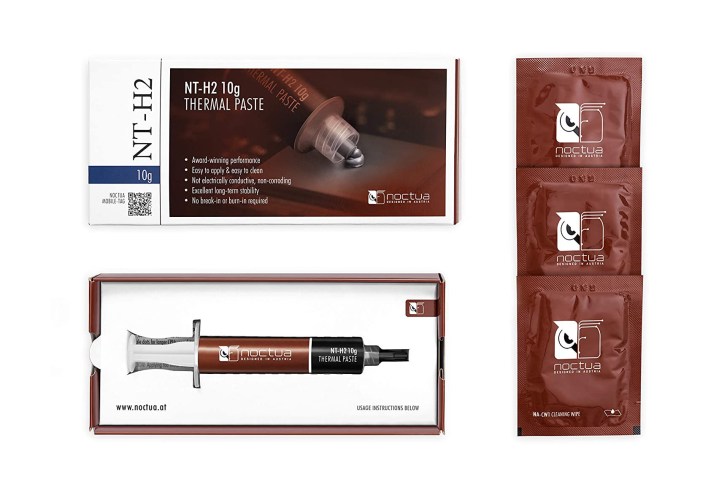
Image used with permission by copyright holder
Noctua NT-H2
Well-rounded successor the popular NT-H1
Pros
- High-performance for air and liquid coolers
- Improved results compared to NT-H1
- Low viscosity for better application
Cons
- Costs more than previous version
Why should you buy this: It is an improved version of the reliable NT-H1.
Who’s it for: Enthusiasts looking for a stable thermal paste with excellent conductivity.
Why we picked the Noctua NT-H2:
The Noctua NT-H1 has been around for a very long time and continues to be a community favorite when it comes to quality thermal pastes. The company also offers an improved version of the NT-H1 called the Noctua NT-H2. The enthusiast-grade paste can be used for air- or water-based cooling, CPU or GPU applications, overclocking, or silent systems. The new formula comes with a mixture of metal oxide micro-particles for lower thermal resistance and reduced bond-line thickness at typical mounting pressures. It is easier to spread thanks to its lower viscosity, can be stored for up to three years, and has a durability rating of five years when applied on a CPU. When it comes to performance, it delivers excellent results capable of surpassing its predecessor and giving stiff competition to the Thermal Grizzly Kryonaut, which is the best in the business.

Noctua NT-H2
Well-rounded successor the popular NT-H1
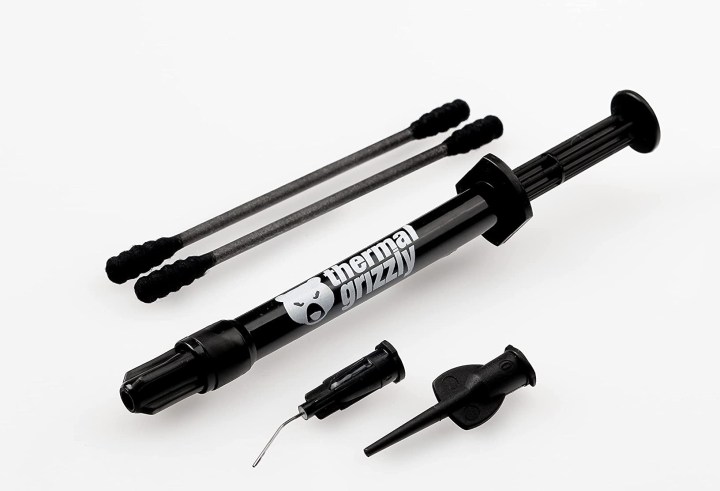
Image used with permission by copyright holder
Thermal Grizzly Conductonaut
Best-performing liquid metal compound
Pros
- Highest conductivity of all thermal compounds
- Excellent performance for overclocking
- Will improve cooling performance on just about anything
- Used by most professional overclockers
Cons
- Needs expertise to apply
- Electrically conductive
Why should you buy this: It is the best liquid metal-based thermal compound.
Who’s it for: Enthusiasts and overclockers who want extreme performance.
Why we picked the Thermal Grizzly Conductonaut:
Liquid metal offers the best performance compared to any thermal paste out there, and the Thermal Grizzly Conductonaut proves that with its rated thermal conductivity of 73 W/mk. It has the potential of reducing temperatures by over 10 degrees Celsius in certain cases. The incredible performance of this liquid metal compound comes at a cost, though. Since it is electrically conductive, it can damage parts of your system if you don’t apply it properly.
While it should work well with copper and nickel, using liquid metal with aluminum is not a good idea as it can react badly and not do its intended job. Thus, it is highly recommended to do proper research before trying to cool your CPU with liquid metal. Thermal Grizzly does offer some useful tools with the Conductonaut, including a special extraction tip and some swabs to spread the compound easily. Having said that, applying liquid metal to your CPU or GPU can be a tedious task and way more difficult to remove in case of incorrect application.

Thermal Grizzly Conductonaut
Best-performing liquid metal compound
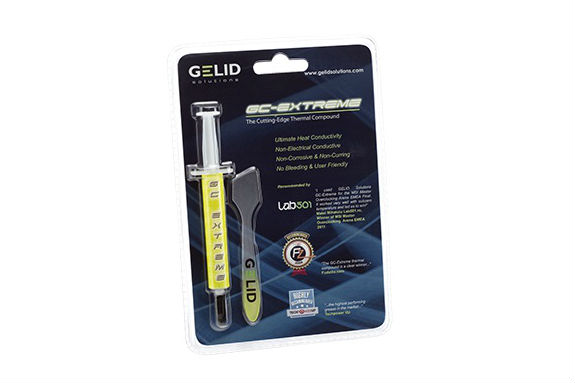
Image used with permission by copyright holder
Gelid GC-Extreme
Performance at a fair price
Pros
- Value for money
- Great thermal conductivity rating
- Easy to use
Why should you buy this: It offers high thermal conductivity and performance at a competitive price.
Who’s it for: Overclockers looking for a great thermal paste on a budget.
Why we picked the Gelid GC-Extreme:
Gelid’s GC-Extreme is a good choice for those who want a higher-end product but aren’t really invested enough to get something at the very top like the Kryonaut. GC-Extreme is still a very great paste and will likely outperform most other paste options, but it’s in the affordable range. This paste is particularly good to keep on hand if you make frequent computer upgrades or have a larger project and want a very effective paste to see you through. With a thermal conductivity rating of 8.5 W/mK, the GC-Extreme is available in 1-gram, 3.5-gram, and 10-gram sizes, and with the new packaging, you get two nozzle types for easy application.

Gelid GC-Extreme
Performance at a fair price
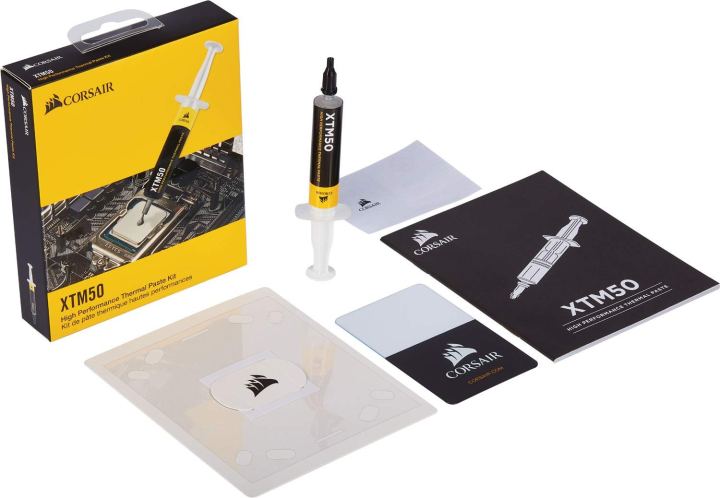
Image used with permission by copyright holder
Corsair XTM50
Thermal paste installation made easy
Pros
- Kit includes stencil and applicator
- Good for first-time PC builders
- Simple to apply
Cons
- Average thermal conductivity
Why should you buy this: It comes with an easy solution to apply the paste effectively.
Who’s it for: First-time PC builders and amateurs.
Why we picked the Corsair XTM50:
Apart from its wide range of peripherals and cooling hardware, Corsair also makes thermal paste. The XTM50 is Corsair’s “high-performance” paste that comes with an included application stencil and spreader that makes the whole process a lot easier. It’s a very smart move that caters to amateur and first-time PC builders who are not sure about how thermal paste needs to be applied. As for performance, it isn’t the best thermal paste, but it should get the job done. It comes with a thermal conductivity rating of 5 W/mk, which is pretty average. It isn’t expensive, either, although we really wish that it was offered in a size other than just 5 grams.

Corsair XTM50
Thermal paste installation made easy
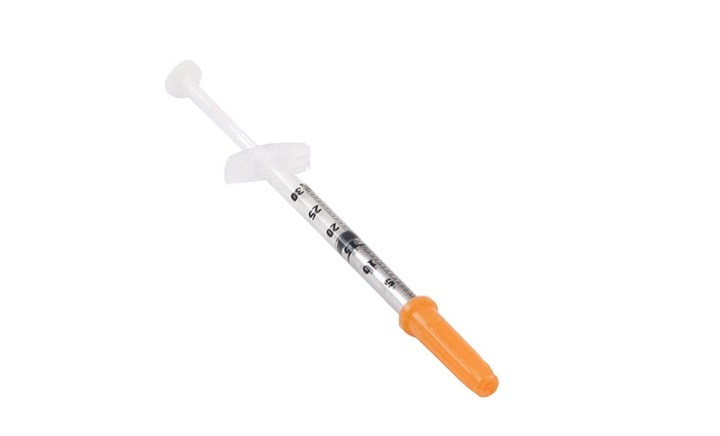
Image used with permission by copyright holder
Phobya Liquid Metal Thermal Compound
Best budget liquid metal thermal compund
Pros
- Cost-effective liquid metal paste
- Great performance
- High thermal conductivity
- Good option for first liquid metal usage
Cons
- Difficult to apply
- Electrically conductive
Why should you buy this: Recommended liquid metal-based compound at affordable pricing.
Who’s it for: PC building enthusiasts who want to experiment with liquid metal compounds.
Why we picked the Phobya Liquid Metal Thermal Compound:
The Phobya Liquid Metal Thermal Compound is for serious PC builders and testers who don’t want to spend a lot of money for something premium like the Thermal Grizzly Conductonaut. It is rated for 40 W/mK thermal conductivity, which means it should easily handle heavy loads as well as overclocked CPUs like a champ. It is also rated as one of the top-rated liquid metal compounds, competing with the likes of Thermal Grizzly’s Conductonaut and the CoolLaboratory Liquid Pro.
Like all liquid metal thermal compounds, you need to be extra careful while using this paste. Apart from the fact that liquid metal itself can be very difficult to apply, it is electrically conductive and not recommended to use with aluminum.

Phobya Liquid Metal Thermal Compound
Best budget liquid metal thermal compund
Frequently Asked Questions
What does thermal paste do?
Often referred to as thermal grease or thermal compound, it is a viscous substance that is applied between the CPU and the cooler. The core function of thermal paste is to offer improved conductivity and remove any irregularities or air gaps between the cooler surface and the integrated heat spreader (IHS) of the CPU. Using a good-quality thermal paste ensures that your CPU runs cooler and doesn’t need repasting for a long period of time.
What is the right amount of thermal paste that one should apply?
There are many debates about how much thermal paste one should apply to their CPU. Having more thermal paste is not going to offer better thermal performance. In fact, you could end up doing the opposite, and in some cases, you could cause permanent damage to the motherboard or CPU. Most professionals recommend that a small blob, roughly the size of a pea, should do the trick. Put some paste right in the middle of the IHS and install the cooler in one go so that there are no trapped air bubbles. You could also use an applicator that looks like a tiny spatula to evenly spread the paste over the IHC before installing the cooler. For more information on how to apply or remove thermal paste, check out our simple guide.
How much of a temperature drop can one expect when using aftermarket thermal paste?
A good-quality thermal paste can help in reducing CPU temperatures by 2 to 3 degrees, while certain expensive options can even go over 10 degrees. With that said, a lot depends on your CPU cooler, ambient temperatures, and how efficiently the paste has been applied.

